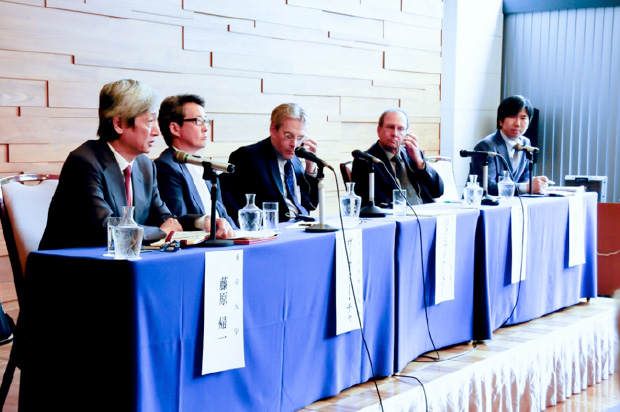The Shifting Dynamics of the U.S.-Japan Alliance
| Date: | Thursday, June 16 2016, 10:00-12:00 |
|---|---|
| Venue: | Iwasaki Koyata Memorial Hall, International House of Japan |
| Speakers: |
Victor D. Cha (Georgetown University) G. John Ikenberry (Princeton University) Yuichi Hosoya (Keio University) Michael Mastanduno (Dartmouth University) |
| Moderator: | Kiichi Fujiwara (University of Tokyo) |
| Language: | English/Japanese simultaneous interpretation |
| Hosted by: |
Security Studies Unit, Policy Alternatives Research Institute, the University of Tokyo Princeton University Dartmouth University In cooperation with the International House of Japan |
*This workshop was organized through subsidies from the Ministry of Foreign Affairs.
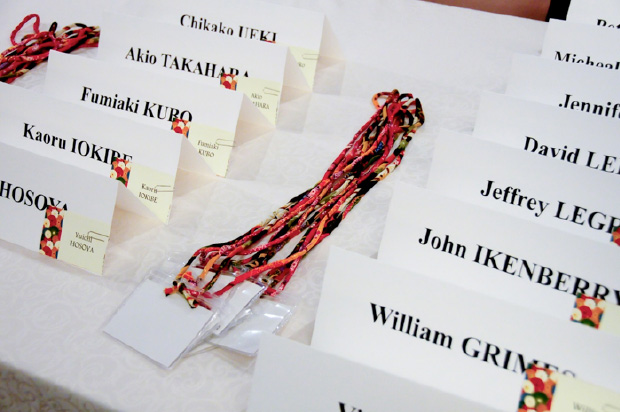
Photo: Izawa Hiroyuki
The Security Studies Unit (SSU) of the Policy Alternative Research Institute was glad to organize, in collaboration with Princeton University, Dartmouth College, and the International House of Japan, an international workshop on the theme “Alliance in Today's World.” The event took place at the International House of Japan (Roppongi, Tokyo) on June 15-16, 2016, and it was articulated in four closed sessions, and one public session “The Shifting Dynamics of the U.S.-Japan Alliance.” The workshop was made possible by financial assistance from the Ministry of Foreign Affairs of Japan.
Session I: Alliance in Time of Global Changes
The first session was chaired by Professor Ikenberry, while panelists were Victor D. Cha, Professor of Government and International Affairs at Georgetown University, Professor Kiichi Fujiwara, and Jennifer M. Lind, Associate Professor of Government at Dartmouth College.

Session II: Regional Contention and Alliance Politics
The second session was chaired by Professor Mastanduno, who also acted as a panelist. Other panelists were William Grimes, Professor of International Relations and Political Science at Boston University, and Akio Takahara, Professor of Chinese Politics at the University of Tokyo.
Session III: Domestic Politics and Alliance Politics
The third session was chaired by Professor Fujiwara, while panelists were Kaoru Iokibe, Professor of Japanese Politics at the University of Tokyo, Peter Trubowitz, Professor of International Relations and Director of the US Centre at the London School of Economics and Political Science (LSE), Fumiaki Kubo, A. Barton Hepburn Professor of American Government and History at the University of Tokyo, and David R. Leheny, Professor of East Asian Studies at Princeton University.
Session IV: A Globalizing Alliance?
The fourth session was chaired by Professor Takahara; panelists were Yuichi Hosoya, Professor at the Faculty of Law, Keio University, Chikako Kawakatsu Ueki, Professor at the Graduate School of Asia-Pacific Studies, Waseda University, and Jeffrey W. Legro, Taylor Professor of Politics and Vice Provost for Global Affairs, University of Virginia.
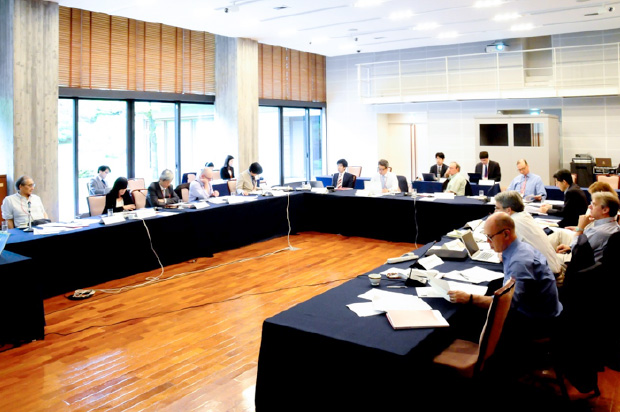
Public Session: The Shifting Dynamics of the US-Japan Alliance
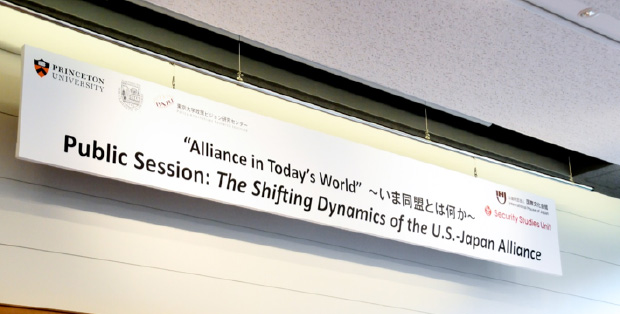
The event was chaired by Kiichi Fujiwara, Professor of International Politics at the University of Tokyo and SSU Director, and saw the participation as panelists of Victor D. Cha, Professor of Government and International Affairs at Georgetown University, G. John Ikenberry, Albert G. Milbank Professor of Politics and International Affairs at the Department of Politics and the Woodrow Wilson School of Public International Affairs, Princeton University, Michael Mastanduno, Nelson A. Rockefeller Professor of Government, Dartmouth College, and Yuichi Hosoya, Professor at the Faculty of Law, Keio University.
Professor Fujiwara opened the session by thanking the attendees, the panelists, and especially those institutions which allowed the organization of the event, in particular the International House of Japan and the Ministry of Foreign Affairs of Japan. After introducing the speakers to the public, he provided a brief introduction concerning the topic of the US-Japan alliance. This tends to be handled in a quite polarized way in the Japanese media, oscillating between fear of entrapment if the alliance gets too tight, and the opposite fear of abandonment if it gets too loose. However, in this workshop a different approach has been articulated, one which captures the complexity of the issue. He then invited each panelist to deliver their interventions.
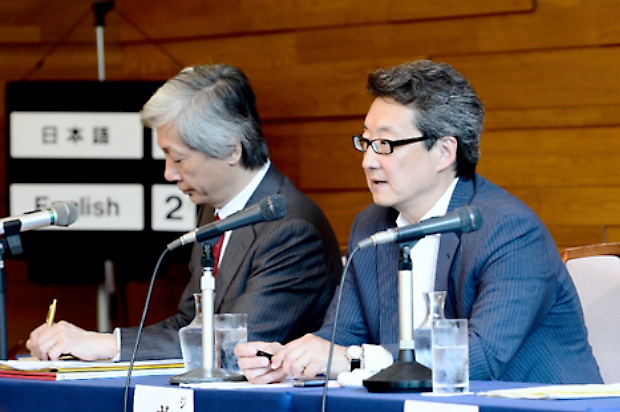
Professor Cha opened his intervention by remarking that in the East Asian region the rise of China is inducing its neighbors to make strategic decisions within a range of options. This range is determined by two main factors, namely domestic stability and cohesion of the political community, and the degree of confidence in the hegemon. The range of strategic possibilities narrows if one of these two elements deteriorates. Professor Cha proceeded then to illustrate his point with a number of historical examples. Coming to the current situation, he made four final points: a) While Japan appears to be domestically stable, other countries in the region have domestic issues which may push them towards accommodating the rise of China, thus leaving Japan in a more isolated position; b) an improved trilateral cooperation (Japan, US, South Korea) appears to be a priority; c) the US must be more committed to its strategy of rebalancing (so called “pivot”) than it has been so far; d) Values are important in alliances, as these cannot be only about “deals” and trade-offs between states.
Professor Ikenberry sketched in his intervention the image of a changing US-Japan alliance in the context of shifts occurring in the East Asian region and globally. Japan and the US should work together to shape order. The international political landscape in Asia is becoming more complex in terms of diplomatic and economic exchanges, as well as of military rivalry. Two hierarchies are being shaped: a security hierarchy led by the US, and an economic one dominated by China. This has three implications: 1) Japan and other nations are trying to avoid hard choices. 2) The US and China are now competing for leadership, but on the other hand they can still find spaces for dialogue. There are risks though, especially of China’s aggressiveness leading to self-encirclement. 3) Rules and international norms are increasingly challenged by the rise of an illiberal power in a liberal world order. Japan and the US must work together to protect those rules, as Prime Minister Abe said in his recent speech in the US.
Professor Mastanduno stressed that the East Asia region finds itself in a rapid and substantial change. Looking back at the recent past, the 1990s was an era of great hopes. At that time, the US was very powerful and possessed a rather clear idea of international order, including that of a strategic partnership with China, particularly concerning the governance of the global economy. However, the situation has since changed, mainly as a consequence of the 2008 financial crisis,
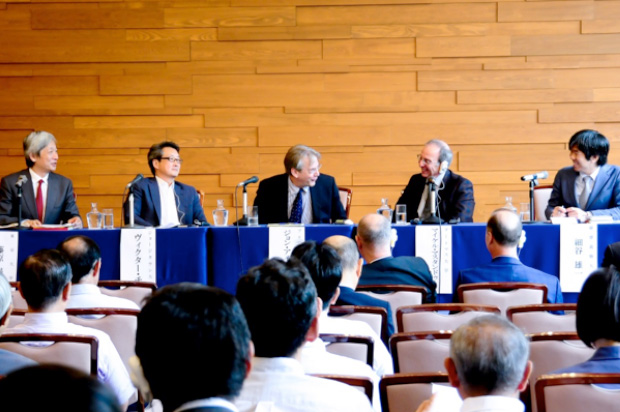
while the rise of China is becoming more problematic because of the country's assertiveness. Recently, the US has also been doing its part in creating anxieties though the resurgence of isolationist and protectionist tendencies. We are in a time of uncertainty which in some ways resembles the 1945-1949 period in Europe, when there was uncertainty about future US commitments. The good news is however that the US and China are developing relations where rules for reciprocal accommodation can arise.
Professor Hosoya reconstructed in his intervention the history of post-war Japan’s international posture, highlighting how the country periodically had to deal with acute regional crises, such as the Korean War, the Vietnam War, and the nuclear crisis in the Korean peninsula. However, the current situation, variously described as “power shift” or “rise of China”, entails different properties, as it is about a long term structural transformation of the region and its dynamics. What are the implications for the US-Japan alliance? If Donald Trump will become the next US President, even if he softens his current stance, we may witness a more isolationist US, and a more assertive China on the other hand. Professor Hosoya stressed therefore the need to counter populist forces, which are working against the liberal international order, which instead ought to be preserved, and Japan should be committed to that goal.
